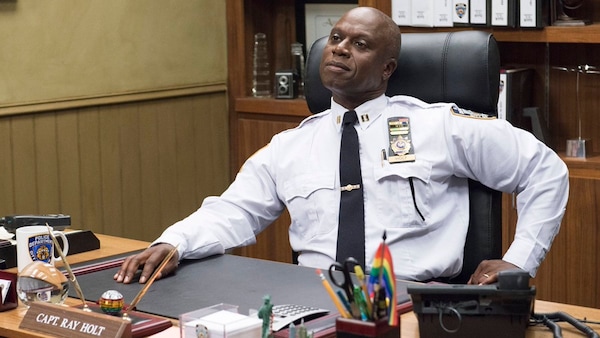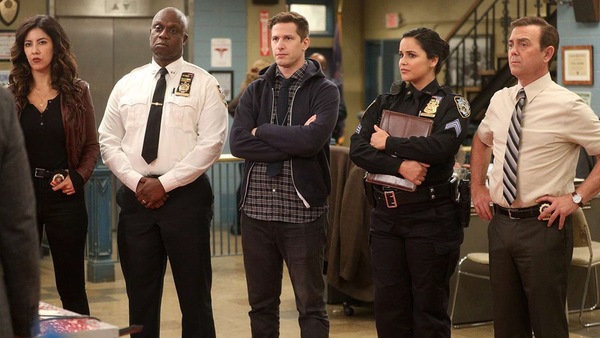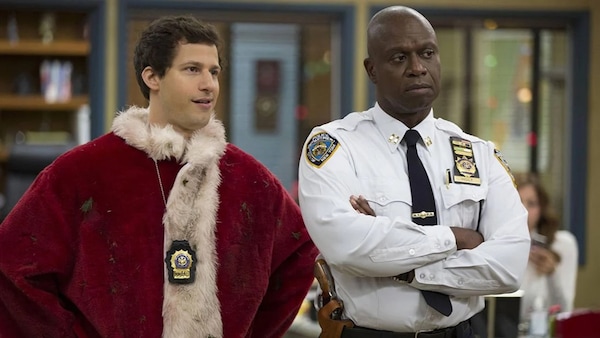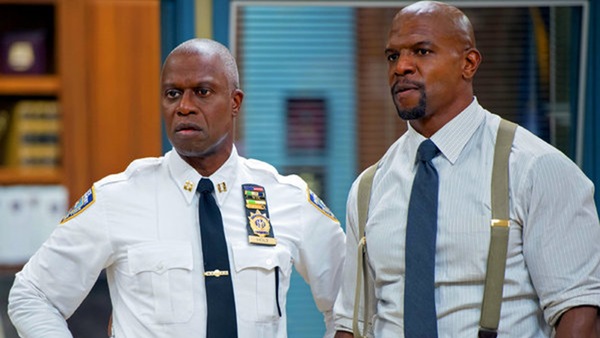Dear Captain Holt, Thank You For Your Service
In the annals of pop culture, Brooklyn Nine-Nine was the last great sitcom, and Captain Holt (played by the late Andre Braugher) the apogee of minority affirmation.

Andre Braugher as Captain Holt in Brooklyn Nine-Nine
Last Updated: 02.15 PM, Dec 13, 2023
This column was originally published as part of our newsletter The Daily Show on December 13, 2023. Subscribe here. (We're awesome about not spamming your inbox!)
***
IN a scene from Brooklyn Nine-Nine, Doyle (Joe Lo Truglio), the overzealous foodie of the Nine-Nine unit approaches his captain, prompted by the hint that he might be into ‘food talk’. “I have zero interest in food. If it were possible, my diet would consist of beige flavourless smoothies, containing all the nutrients required by the human animal,” the captain says, deadpan. It’s a scene that captures the dispassionate exterior of a middle-aged man who has to play father figure to an entire group of rookies. Indulge one of them, and you might have to indulge the entire lot; dismiss them entirely and you invite a colourful mutiny. In the archive of pop culture, of which Brooklyn Nine-Nine might be the last great sitcom, the late Andre Braugher’s Captain Holt will stand out as the apogee of minority affirmation.
Brooklyn Nine-Nine was quirky, imprecise and unlikely in so many ways, its existence felt like an oddity itself. A good-cop-good-cop routine that subverts the hardened male gaze of a world spiralling towards violence — especially in a country notorious for police brutality and sketchy gun laws — sounds whacky, maybe even implausible. But this well-mannered, soft gaze that at times stretched a painful blind spot, became part of the show's assuring and ultimately escapist identity. Central to that idea was this crèche-like assembly of nervy, competitive officers who needed to be governed by someone who had endured it all. Someone who could destress the conflict of cultural, sexual and gender politics by borrowing from his own life. In walked Captain Holt, a Black, gay man who had risen through America’s justice system, only to become the weary, exhausted but amiable specimen of social injustice. Naturally, in a show full of goofy self-appraising characters, he was methodically dull and committedly unimpressed.

The Nine-Nine rarely felt like a precinct where crime and corruption could fester. It felt like a goblet full of bickering, but ultimately empathetic people who indulged petty office feuds. It’s just what the world is, adolescent anxieties meeting nervy existential burdens. To that messy splatter of ideas, Holt represented that shapely reality check. His history made him the reclusive, grammar-obsessed, nonchalant top dog he eventually became but his present made him the self-conscious leader who knew the importance of preventing disassociation from his sexuality and his race. Aspects that remained an elegant, if subdued part of his being through a show in which he was private, dignified and a bit of recluse throughout.
To those of us who have grown up around uncommunicative father figures, Captain Holt echoed the toughened exterior that comes with concealing grief and vulnerability. In the show, this plain surface cracks every now and then to reveal a man waiting to let go, burst into chaos or break free of his own maniacal regiment. Ironically, Holt despised the idea of ornamentation, millennial concepts like over-the-top celebrations and petty gifts when he himself wore the meatiest ornament of all — a thick, deceptive skin for all that he had seen and endured. It takes maybe the discipline of a survivor to get through the mulch of instinct and bias to come out the other side, scathed but undiminished. Empathy though can distract even the most well-drilled humans into opening up. It’s what Captain Holt became, as he careered towards his retirement, that momentous point of letting go of the rope trick he had been identified by all his life.

Braugher had obviously done other work, including an Emmy-winning turn as a homicide detective in the rather straightforward Homicide:Life on The Street. Consider it providence then that his greatest contribution to pop culture would be to turn one of his own fleece-jacketed tough cop routines inside out, by graciously addressing the complexities of sexuality and race from behind a desk that allowed him bureaucratic powers, but hardly any agency. As the Black, homosexual captain of an underperforming precinct, Holt was surveyed, scrutinised and ultimately tamed in a million different ways. It was no small feat then that he allowed his subjects, the bandits of the Nine-Nine, to let loose and be who they actually were. Even though he himself couldn’t.

Pop culture woke-ism has become a bit of a modern canon, and with streaming’s reach and flexibilities, a lot more can be done with ideas comparatively edgier than a gay, Black man leading a police office of misfiring caricatures. It subverts not only the idea of state-enacted authority, but of the strongman narrative taking over the global. For Holt merely pretended to be strong, so none of his colleagues could inherit his weaknesses. He marginally opened up, momentarily expressing his frailties like exposed skin, but most of him, or at least the part he knew wouldn’t make sense to anyone, remained hidden. And so he lived on as maybe pop culture’s bravest missteps, a living, breathing oxymoron, queered by nature, body and circumstance. Fittingly, he once christened himself — through gnashed teeth and visible discomfort — as ‘Velvet Thunder’. Thunder on, my captain.
